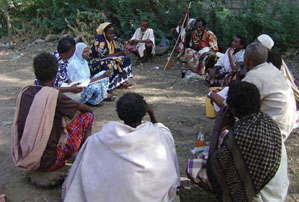9.2.5 Justice
Justice is the obligation to be fair in your health work to all the people for whom you are responsible. Justice means that individuals, families or communities should be treated fairly regardless of their ethnicity, culture, spiritual beliefs, social or marital status, gender, age, health status, and mental or physical disability. Even if something happened to you and you developed a disability, you would still be the same person and would want to be treated fairly. As a Health Extension Practitioner, you also have a moral obligation to be fair to all people in your locality while providing health services (Figure 9.7). You should look on ways that all health resources are used and try to bring about maximum good (beneficence) and serve the largest number of people (utilitarianism).

Imagine that you are a Health Extension Practitioner and your woreda has given you a sum of money to improve the health of your population. You also need a new water supply for the sink in your Health Post. How should you spend the money?
Although you need water for your sink you should think carefully if this is the best way to spend the extra money. The way to decide would be to ask the people in your community what they think would be the best way that this extra money should be spent. Perhaps they will agree with you that a clean water supply to the Health Post is a priority!
9.2.4 Confidentiality
